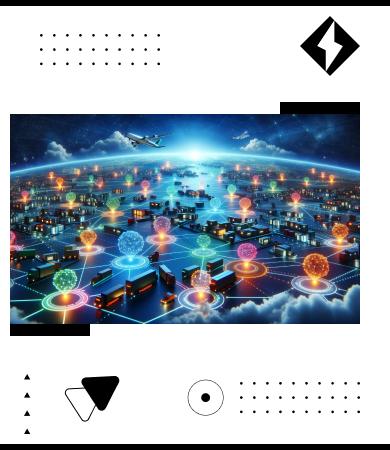Support center +91 97257 89197
Logistics SolutionApril 2, 2024
Smart Contracts: Automating Logistics and Supply Chain Management

Introduction
The logistics and supply chain industry, the backbone of global trade, has long grappled with challenges such as inefficiency, fraud, lack of transparency, and administrative overhead. However, the advent of blockchain technology and its application through smart contracts promises a seismic shift in how we manage and execute transactions within this space.
Understanding Smart Contracts
At the core of this revolution are smart contracts, self-executing contracts with the terms of the agreement directly written into code. Stored and replicated on a blockchain network, these contracts run when predetermined conditions are met, without the need for intermediaries. This autonomy not only streamlines processes but also introduces a level of security and trust previously unattainable in traditional contract law.
The blockchain, the underlying technology of smart contracts, is a decentralized ledger that records transactions across many computers. This decentralization ensures that the record cannot be altered retroactively without the alteration of all subsequent blocks and the consensus of the network, offering an unprecedented level of transparency and security.
The Role of Smart Contracts in Logistics and Supply Chain Management
The application of smart contracts in logistics and supply chain management is multifaceted. They automate essential functions such as agreements, payments, and even compliance, dramatically reducing the time and cost associated with these processes.
Automating Agreements and Payments: Smart contracts execute automatically when predetermined conditions are met, ensuring that payments are released only when goods are delivered or services are rendered as agreed. This automation significantly reduces delays and disputes.
Enhancing Transparency and Traceability: Every transaction in a blockchain is recorded in a way that is both immutable and transparent. This feature ensures that every product's journey can be tracked from origin to delivery, offering an unmatched level of traceability.
Reducing Fraud and Human Errors: By automating processes and removing the need for manual intervention, smart contracts significantly reduce the potential for human error and fraud, ensuring that the terms of the contract are executed exactly as intended.
Integration Challenges and Solutions
Despite their promise, integrating smart contracts into existing logistics and supply chain systems is not without challenges. Technical barriers, resistance to change within organizations, and legal and regulatory hurdles stand as significant obstacles. Overcoming these challenges requires a strategic approach, involving technology upgrades, stakeholder education, and active engagement with regulators to shape a conducive legal framework.
Practical Applications and Real-World Examples
Smart contracts are not mere theoretical constructs; they are actively redefining the logistics and supply chain landscape with several notable applications:
-
Streamlined Freight and Carrier Agreements: Companies like FedEx and UPS are experimenting with smart contracts to automate their freight and carrier agreements. These contracts execute automatically based on real-time data, ensuring efficient, error-free processing of agreements and payments.
-
Improved Inventory Management: Smart contracts facilitate real-time, automated inventory management by integrating with IoT devices. This system ensures optimal stock levels are maintained, reducing excess inventory and associated costs.
-
Enhanced Supply Chain Finance: Smart contracts enable more efficient and transparent supply chain financing solutions. By automating payment terms and credit triggers, they offer quicker access to capital for businesses, enhancing liquidity in the supply chain.
Real-World Example: A notable case is the partnership between Walmart and IBM on the Food Trust Blockchain. This initiative leverages smart contracts to improve food traceability, allowing Walmart to track produce from farm to shelf in real-time, significantly reducing the time to identify and remove contaminated foods.
Addressing Challenges for Integration
While smart contracts hold immense potential, their integration into existing systems poses several challenges:
-
Interoperability: With numerous blockchain platforms available, ensuring interoperability among different systems is crucial. Standardizing protocols and data formats is essential for seamless communication and data exchange.
-
Scalability: As transactions increase, maintaining the performance and speed of smart contracts is vital. Solutions like layer-2 scaling and sharding are being explored to address these concerns.
-
Regulatory Compliance: Navigating the complex web of global regulations remains a significant hurdle. Continuous engagement with regulatory bodies and alignment with legal standards is necessary for widespread adoption.
Looking Ahead: The Future of Smart Contracts in Logistics
The future of logistics with smart contracts extends beyond mere automation and efficiency improvements. It envisions a fully integrated, responsive, and adaptable supply chain ecosystem:
-
Integration with Emerging Technologies: The synergy between smart contracts, AI, and IoT will lead to more predictive and adaptive supply chains capable of autonomously responding to market changes and disruptions.
-
Sustainability and Ethical Sourcing: Smart contracts can enforce sustainability standards and ethical sourcing practices by automating compliance with environmental regulations and social responsibility guidelines.
-
Decentralized Autonomous Organizations (DAOs): The concept of DAOs in logistics could redefine organizational structures, with smart contracts automating governance, operations, and decision-making processes.
Future Prospects
Looking ahead, the integration of smart contracts in logistics and supply chain management could be further enhanced by complementary technologies such as the Internet of Things (IoT) and Artificial Intelligence (AI). IoT devices could provide real-time data to trigger smart contracts, while AI could predict potential disruptions and automate more complex decision-making processes.
Conclusion
Smart contracts are poised to revolutionize logistics and supply chain management, offering solutions to longstanding challenges of efficiency, transparency, and trust. As we navigate the hurdles of integration and adoption, the focus must be on fostering collaboration, driving innovation, and shaping conducive regulatory frameworks.
The journey towards fully leveraging smart contracts in logistics is complex, but the potential benefits for global supply chains are undeniable. Businesses that proactively embrace this technology will not only enhance their operational efficiencies but also contribute to more resilient, sustainable, and transparent global trade networks.
TLDR
Explore how smart contracts, powered by blockchain, are setting the stage for a revolution in logistics and supply chain management. From automating transactions to ensuring unprecedented transparency, discover the transformative impact and future prospects of smart contracts in this domain.
FAQs
Smart contracts operate on blockchain technology, where each transaction or operation is recorded in a tamper-proof ledger. This ensures that every step of the supply chain, from manufacturing to delivery, is transparent and accessible to all involved parties.
Once deployed, smart contracts cannot be altered; they are immutable. This immutability ensures that the terms of the contract cannot be changed without consensus, thereby enhancing trust among parties.
Smart contracts automate many processes that traditionally require manual intervention, such as payments, compliance checks, and contract enforcement. This automation reduces administrative overhead, speeds up transactions, and can significantly lower operational costs.
While blockchain provides transparency, it also offers mechanisms to maintain privacy. Sensitive information can be encrypted or managed through private blockchains, ensuring that confidential data remains secure.
Smart contracts often integrate with IoT devices. These devices monitor and verify conditions like temperature or location, and this data triggers smart contract actions, ensuring that physical goods are managed according to the pre-defined rules in the contract.
Work with us







